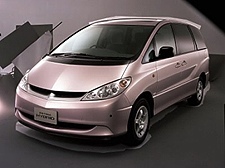At Tokyo Auto Show, all the talk is of fuel
From Mazda's car that promises to use hydrogen to
run a rotary engine to a General Motors sports utility vehicle powered by fuel
cells, carmakers are competing at the Tokyo Motor Show to send buyers a message:
They have learned the lessons of the Prius.

Toyota has clearly hit a car industry nerve with the Prius, its gasoline-electric hybrid, whose popularity was reflected in the company's earnings report Friday. Toyota seems to be defying an industrywide slump triggered by soaring gasoline prices, which have hit its U.S. rivals particularly hard.
Toyota said net profit in its fiscal half-year, which ended Sept. 30, was ¥570 billion, or $4.86 billion, while sales rose 10.3 percent from a year earlier to ¥9.95 trillion. Toyota said net profit slipped 2.3 percent in the six months as it raised spending on new factories to meet robust demand for its fuel-efficient vehicles.
"We think we can keep a high level of profitability," a Toyota senior managing director, Takeshi Suzuki, said Friday, describing the rise in factory costs as a one-time hit to earnings. "We have to add this spending to keep up with the expanding market."
Toyota is building new factories and GM has achieved junk bond status.
Sales have remained relatively strong for all major Japanese carmakers despite rising fuel prices, partly because of their reputation for building reliable, high-mileage vehicles. Their performance has contrasted with Detroit, where General Motors and Ford Motor have posted huge losses in the most recent quarter amid tumbling sales of their main breadwinners, gas-guzzling pickup trucks and sport utility vehicles.
Toyota's announcement Friday also showed that the company remains on track to overtake General Motors as the biggest producer of autos, a position that GM has held since 1931. Toyota, No. 2 worldwide, raised its production forecast for its full year, which runs through March 2006, to 8.03 million vehicles, up 8.4 percent from the previous year.
GM still has their brain in 1931.
Toyota hopes that the runaway sales success of the Prius will allow it to push hybrids into large volume production. Next year, Toyota plans to increase worldwide Prius production to 400,000, from 300,000 this year.
By the end of the decade, Toyota expects to be selling one million hybrids worldwide. By increasing production of hybrids, Toyota aims to cut costs for batteries, electric motors and other parts. In turn, Toyota and Honda say they hope to reduce the cost of a hybrid car to that of a standard, gasoline-powered car in the same time period.
"To make it really work, the cost has to be cut in half," said John Mendel, a senior vice president at Honda's American subsidiary. "The cost of the batteries is very high. We fortunately control the cost of the CPU, the electric motor."
These guys don’t think like American auto manufacturers. Fortunately.
Posted: Sat - November 5, 2005 at 08:05 AM